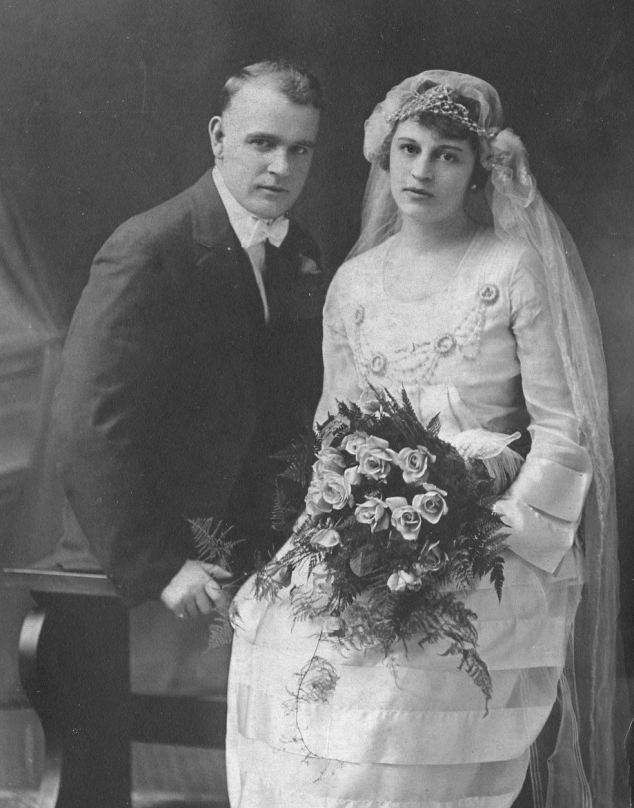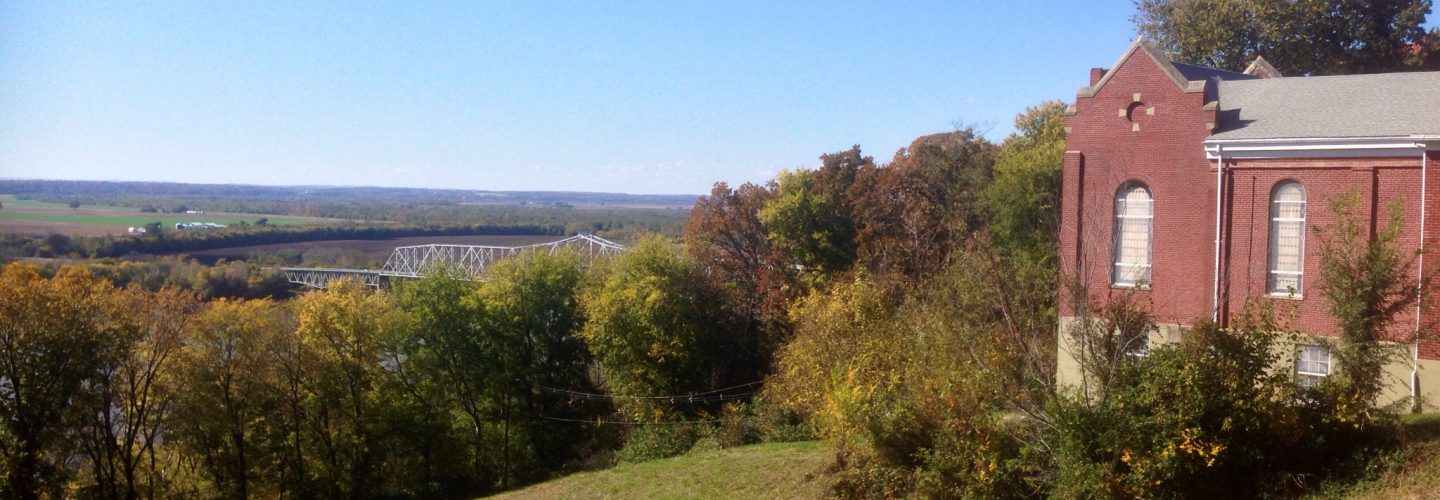
A pastor, a military chaplain, and a light in the darkness, the Reverend Henry F. Gerecke devoted his life to ministering to the most vulnerable, marginalized, and culpable members of society, even those who stretched the limits of his understanding of forgiveness.
Henry Frederick Gerecke was born on August 4, 1893, near Cape Girardeau, Missouri. The grandson of German immigrants, he grew up on a farm with his parents, Herman and Lena, and two siblings, Nora and Fritz. The local Lutheran church was an important part of the family’s life, and in 1908, Gerecke began to feel called to become a pastor.

Influenced by popular revivalist ministers, Gerecke decided to enroll in St. John’s Academy and College in Winfield, Kansas, in 1913. The school was a prep academy where students could earn a college degree before moving on to seminary studies. Gerecke’s time at St. John’s helped him polish his classical studies and his oratory and German language skills. He found an outlet for his love of music in the school’s orchestra program. His natural leadership tendencies also flourished; he became president of the student body in 1918. He nearly decided to interrupt his studies altogether, though, after the United States entered World War I; his father pulled him out of an enlistment line and sent him back to school.
After graduation, Gerecke moved to St. Louis to begin studies at Concordia, one of two American seminaries affiliated with the Lutheran Church-Missouri Synod. But Gerecke’s studies were derailed when he met Alma Bender, the daughter of a local brewer. The couple married in 1919 – a decision that directly violated the standards for students at Concordia, who were forbidden to be engaged or married. He was expelled from the seminary and forced to seek other work. With the help of mentors like the Rev. Richard Kretzschmar, Gerecke found a teaching position and began private studies to work toward his ordination. He passed his exams at Concordia and was ordained in 1926, becoming the pastor at Christ Lutheran Church in the heart of St. Louis. By the end of the decade, he and Alma also had three sons: Henry, Carlton, and Roy.

Gerecke’s life at Christ Lutheran was fruitful, but he soon felt a calling to an even more challenging pastoral assignment. He left his post in 1935 to become the executive secretary of the St. Louis Lutheran City Mission, as well as the pastor at Good Shepherd Lutheran Chapel in Columbus Square. The mission was focused on ministering to the neediest populations in the city. Gerecke’s biographer, Tim Townsend, enumerates some of the departments of the mission’s work, including “city institutions, mission schools, prison welfare, court work, social services, child-saving work, and care for the aged and incurables.”
In the midst of the Great Depression, Gerecke worked tirelessly to aid the sick, the poor, the hungry, the hospitalized and institutionalized, the homeless, and the imprisoned. He installed a bright neon cross atop Good Shepherd and announced that the beacon “lights the way on 10th St.” He widened the scope of his ministry even further by preaching on his own radio show, Moments of Comfort. The program was so popular that Gerecke was approached by radio giant KMOX to work full-time as a broadcaster. Ever busy with his multiple ministries, Gerecke politely declined.

By 1943, the country was in the middle of another war. This time, no one stopped Gerecke from stepping up to serve. He was commissioned as a First Lieutenant in the Army Chaplain Corps. After a very brief stint at Harvard’s chaplain training program, Gerecke was assigned to the Ninety-Eighth General Hospital, a mobile army medical unit. During Gerecke’s two years with the Ninety-Eighth, the unit moved multiple times. They were stationed in Fort Jackson, South Carolina, before moving to England, where they operated in Hermitage, Wiltshire. After the end of the war in Europe, the unit moved to Le Havre, Verdun, and then finally to Munich. Gerecke’s efforts as chaplain earned him respect and praise from his supervisors, who wrote that he “exemplifie[d] the best traditions of the Corps of Chaplains in the Ministry.”
But Gerecke’s most famous and challenging assignment was still to come. He was hand-selected to be the Lutheran army chaplain for the Nazi war criminals who were to be tried at Nuremberg. The Geneva Convention required the military to provide the men with spiritual support. Gerecke’s success with the Ninety-Eighth, his age and German-speaking background, and his experience working with prison populations in St. Louis were all factors in his appointment.
For Gerecke, the decision to accept the job was an incredibly difficult one. Townsend notes that Gerecke was “badly shaken” by the order and illuminates some of his concerns: “He was terrified by the prospect of being close to the men who had tried to take over the world. Would he have to shake their hands? He imagined that simply feeling their breath on his face would be sickening. How could he comfort these Nazis who had caused the world so much heartache? How could he minister to the leaders of a movement that had taken millions of lives? How could he form a spiritual bond with these men without getting in the way of whatever God had planned for them already?” Gerecke had visited the Nazi camp at Dachau, and he understood the atrocities that these men had committed. The decision seemed an impossible one.
After extensive deliberation and prayer, Gerecke finally decided to accept the job. He arrived in Nuremberg in November 1945 and was immediately put to work by his army supervisors. Gerecke did his best to minister to the men on trial, praying with them, holding church services, and even communicating with their families. He and the Catholic chaplain, Father Sixtus O’Connor, remained at Nuremberg throughout the trials, ministering to the prisoners throughout the proceedings and even witnessing many of their executions.
Gerecke won the admiration of his commanding officer at Nuremberg, who wrote to the army’s chief of chaplains about Gerecke’s “sincere devotion to his faith and his constant effort on behalf of the prisoners in this jail,” calling Gerecke “a constant source of admiration.” After Nuremberg, Gerecke returned to the United States, spending Christmas 1946 with his family in St. Louis before reporting to finish his service in Milwaukee, Wisconsin. Many were curious about Gerecke’s time at Nuremberg, and he began giving speeches about his ministry experience there. He was invited by various groups to deliver these remarks hundreds of times, carrying out the kind of speaking outreach that he began years earlier on the radio in St. Louis. Eventually, a version of his story was published in the Saturday Evening Post.
After his discharge from the army, Gerecke moved with Alma to Chester. He took a position as an assistant pastor at St. John’s Lutheran Church, but Townsend notes that “Chester’s real draw was the Menard penitentiary.” Gerecke became the chaplain of not only the prison but also the nearby mental health facility. He also ministered at Chester’s hospital and served as a chaplain to the VFW and the American Legion. Gaining the trust of Menard’s prisoners was not easy; Townsend writes that they were initially “suspicious that [Gerecke] was an undercover snitch sent by prosecutors to gather information.” Eventually, though, Gerecke’s reach within the prison grew, and he became an important spiritual guide to a number of Chester’s incarcerated residents.
On October 11, 1961, Gerecke suffered a heart attack in the parking lot at the prison. He died later the same day at Chester’s hospital. An outpouring of grief from the community followed, with more than a thousand people attending Gerecke’s visitation and funeral at St. John’s. Remarkably, the prisoners at Menard also asked to be able to pay their respects to their fallen chaplain. More than eight hundred of them attended a special visitation for Gerecke inside the prison walls. They also offered Gerecke a more permanent tribute, taking up a collection to buy a neon cross, just like the one Gerecke had installed three decades earlier at City Mission in St. Louis. The Gerecke Cross, recently refurbished and rededicated, still shines from atop St. John’s school in Chester today.

Summing up Gerecke’s remarkable life is not an easy task. Many have echoed a significant verse from the Book of Matthew – one that was invoked by Gerecke’s commander at Nuremberg and by the founder of City Mission – to capture Gerecke’s own mission in life: “For I was hungry and you gave me food, I was thirsty and you gave me something to drink, I was a stranger and you welcomed me, I was naked and you gave me clothing, I was sick and you took care of me, I was in prison and you visited me.” But Eileen Gordon, secretary of St. John’s during Gerecke’s tenure there, perhaps expresses his legacy best: “When someone writes of Pastor Gerecke, they must write of love, because this, indeed, was the essence of the man.”
Henry F. Gerecke was inducted into The Randolph Society in 2017.
